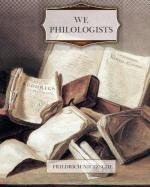Proclus, who solemnly invokes the rising moon.
151
With the advent of Christianity a religion attained the mastery which corresponded to a pre-Greek condition of mankind: belief in witchcraft in connection with all and everything, bloody sacrifices, superstitious fear of demoniacal punishments, despair in one’s self, ecstatic brooding and hallucination, man’s self become the arena of good and evil spirits and their struggles.
152
All branches of history have experimented with antiquity . critical consideration alone remains. By this term I do not mean conjectural and literary-historical criticism.
153
Antiquity has been treated by all kinds of historians and their methods. We have now had enough experience, however, to turn the history of antiquity to account without being shipwrecked on antiquity itself.
154
We can now look back over a fairly long period of human existence . what will the humanity be like which is able to look back at us from an equally long distance? which finds us lying intoxicated among the debris of old culture! which finds its only consolation in “being good” and in holding out the “helping hand,” and turns away from all other consolations!—Does beauty, too, grow out of the ancient culture? I think that our ugliness arises from our metaphysical remnants . our confused morals, the worthlessness of our marriages, and so on, are the cause. The beautiful man, the healthy, moderate, and enterprising man, moulds the objects around him into beautiful shapes after his own image.
155
Up to the present time all history has been written from the standpoint of success, and, indeed, with the assumption of a certain reason in this success. This remark applies also to Greek history: so far we do not possess any. It is the same all round, however: where are the historians who can survey things and events without being humbugged by stupid theories? I know of only one, Burckhardt. Everywhere the widest possible optimism prevails in science. The question: “What would have been the consequence if so and so had not happened?” is almost unanimously thrust aside, and yet it is the cardinal question. Thus everything becomes ironical. Let us only consider our own lives. If we examine history in accordance with a preconceived plan, let this plan be sought in the purposes of a great man, or perhaps in those of a sex, or of a party. Everything else is a chaos.—Even in natural science we find this deification of the necessary.
Germany has become the breeding-place of this historical optimism; Hegel is perhaps to blame for this. Nothing, however, is more responsible for the fatal influence of German culture. Everything that has been kept down by success gradually rears itself up: history as the scorn of the conqueror; a servile sentiment and a kneeling down before the actual fact—“a sense for the State,” they now call it, as if




